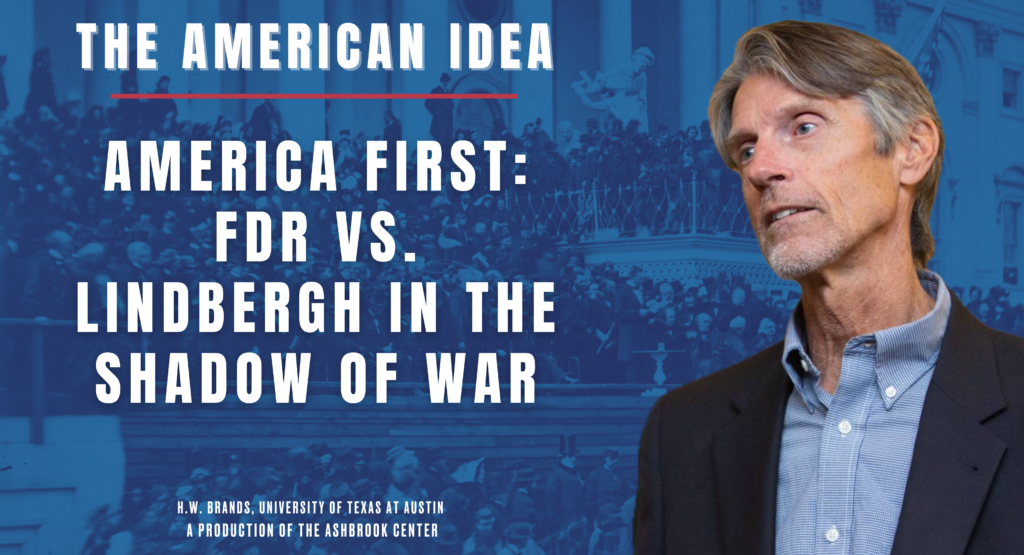America First - FDR vs Charles Lindbergh in the Shadow of War
January 8, 2025

Listen and subscribe to the podcast
Join The American Idea’s Listener Email list – get news about upcoming episodes and a chance to offer questions for them, too!
America’s Role in the World: The Roosevelt-Lindbergh Debate
The late 1930s presented the United States with a profound question: should it remain isolated from the brewing global conflict or step onto the world stage as a leader against aggression? This pivotal debate, encapsulated by the divergent visions of President Franklin D. Roosevelt and aviator Charles Lindbergh, not only framed the nation’s approach to World War II but also echoed through subsequent decades of American foreign policy.
Roosevelt’s Case for Intervention
Franklin D. Roosevelt’s presidency was marked by an acute awareness of the growing threats posed by Nazi Germany and Imperial Japan. As a committed internationalist, Roosevelt viewed the rise of these powers as a direct challenge to American security and global stability. For Roosevelt, neutrality was an untenable position; the survival of democratic nations like Britain and France was essential to preventing a world dominated by totalitarian regimes.
Roosevelt’s argument rested on the idea that proactive support for the Allied powers—even short of direct military involvement—could stave off the need for American soldiers to fight on foreign soil. This rationale drove his push to amend the Neutrality Acts, which initially restricted the sale of arms to warring nations. Roosevelt envisioned the United States as the “arsenal of democracy,” supplying the tools needed for others to confront fascism. His advocacy for the Lend-Lease Act in 1941 further solidified his belief that America’s future was inextricably linked to the outcome of the European conflict.
Lindbergh and the Case for Isolation
Charles Lindbergh, a national hero celebrated for his transatlantic flight, emerged as the leading voice of the America First movement. Lindbergh’s isolationist stance was rooted in a conviction that American involvement in European wars served no national interest. He argued that the nation’s geographic distance provided a natural defense and that resources should be directed toward fortifying domestic security rather than meddling in foreign disputes.
Lindbergh’s rhetoric resonated with many Americans still scarred by the losses of World War I. He warned that aiding the Allies would only prolong the conflict, entangle the United States in European power struggles, and erode freedoms at home. For Lindbergh, Roosevelt’s policies—including aid to the Soviet Union—were not just misguided but dangerous, risking the consolidation of executive power and the potential loss of republican ideals.
The Crucible of War
The invasion of Poland by Germany in 1939 escalated tensions and brought the Roosevelt-Lindbergh debate to the forefront of national discourse. While Roosevelt sought to loosen restrictions on arms sales and rally public support for aid to Britain, Lindbergh’s speeches cautioned against sliding down the path to war. The debate reflected deeper ideological divides: internationalism versus isolationism, collective security versus self-preservation.
The attack on Pearl Harbor in December 1941 decisively ended the debate. The isolationist cause lost its grip on public opinion as the nation unified against a direct assault. Even Lindbergh, though barred by Roosevelt from serving in the military, contributed to the war effort by training pilots and consulting with aircraft manufacturers. The very conflict he sought to avoid became one in which his talents were ultimately deployed.
Enduring Legacy
The Roosevelt-Lindbergh debate left an indelible mark on American history. Roosevelt’s vision of international engagement prevailed, setting the stage for the United States to emerge as a global superpower in the postwar era. His willingness to champion unpopular policies in the short term underscored his belief in the long-term necessity of confronting authoritarianism.
Lindbergh’s warnings, however, also carry a certain prescience. His critique of entangling alliances and military overreach has resurfaced in contemporary discussions about the limits of American power. From debates over NATO commitments to questions about intervention in distant conflicts, the tension between global leadership and national sovereignty remains a defining feature of U.S. foreign policy.
Ultimately, the Roosevelt-Lindbergh debate serves as a poignant reminder of the complexity of America’s role in the world. It is a narrative of competing visions, each rooted in genuine concern for the nation’s future, and one that continues to inform the choices facing policymakers and citizens alike.

